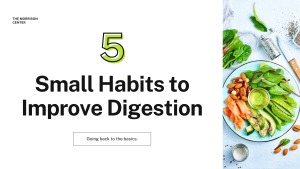
Today, we’re going back to the basics with some tips on how to work towards better digestion by making 5 small changes that can make a powerful impact.
1. Chew. Your. Food.
You’d think that this should go without saying, but let’s be honest here. Are you really chewing as much as you should? For your first 3 bites of food at your next meal, chew each bite until it’s complete mush. This can tell your brain that it’s time to ‘rest + digest’ by activating your parasympathetic nervous system.[1]
2. Eat without distractions
Eat without distractions. As hard as it may be, try putting your phone down, closing the laptop, or dare we say not turn on Netflix, while you eat. Be present with your food and those around you if you’re sharing a meal with company.
3. Slow it down
This may be the hardest one–especially if you live in an urban environment. Sit down and allow your mind and body to truly rest and digest. If you’re a fast eater, put your food or utensil down in between bites so that you’re not constantly shoveling food into your mouth before you even swallow the previous bite. Eating more slowly and chewing thoroughly can support healthy blood glucose and insulin levels, improve satiety, and limit weight gain.[2,3]
4. Take a digestion supplement with meals
Consider taking a supplement to aid with digestion. Be sure to consult with your healthcare provider before starting any one of these.
- Benezyme can aid in the breakdown and absorption of food, allowing you to better utilize those nutrients for energy.*
- Wormwood Black Walnut Supreme contains a traditional herb blend that may increase secretion of digestive juices.[4]
- Ox Bile can support the liver in making bile, which is vital for lipid metabolism and absorption of fat-soluble vitamins A, D, E, and K.*
5. Eat an earlier dinner
You’ve heard it a thousand times before: you shouldn’t be going to bed or lying down shortly after you eat. If you have GERD (aka acid reflux), lying down shortly after your meal can make things worse. Give your stomach some time to digest your last meal before hitting the hay.
Consider working with a health coach
As small as these habits may seem, working them into your unique lifestyle can be a challenge if you are unsure about how to go about doing so. We suggest working consistently with a health coach to help ease you into new changes and maintain accountability for those changes. Call our office to find out more: 212-989-9828.
*These statements have not been evaluated by the FDA and are not intended to treat or cure any disease.
References
- Ohta M, Ueda T, Sakurai K. Effect of chewing or compressing food on autonomic nervous activity in older adults. Gerodontology. 2017;34(4):434-440. https://doi.org/10.1111/ger.12284
- Ting GA, Michelle CJY, Hui CX, et al. Increased oral processing and a slower eatin rate increase glycaemic, insulin and satiety responses to a mixed meal tolerance test. Eur J Nutr. 2021. 60:2719-2733. https://doi.org/10.1007/s00394-020-02466-z
- Hollis JH. The effect of mastication on food intake, satiety, and weight gain. Physiol Behav. 2018;193(Part B):242-245. https://doi.org/10.1016/j.physbeh.2018.04.027
- Batiha GES, Olatunde A, El-Mleeh A, et al. Bioactive compounds, pharmacological actions, and pharmacokinetics of wormwood (Artemisia absinthium). Antibiotics. 2020;9(6):353. https://doi.org/10.3390/antibiotics9060353